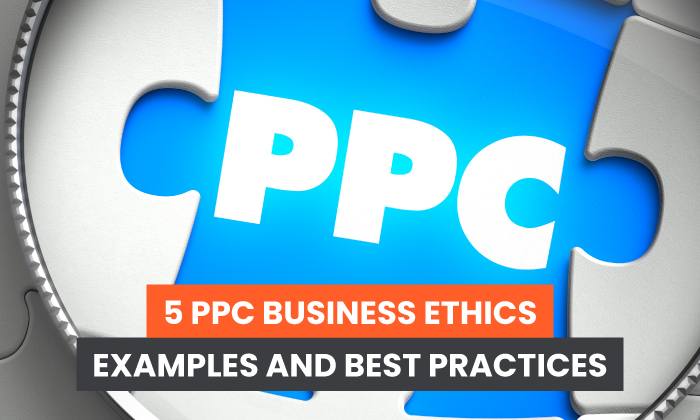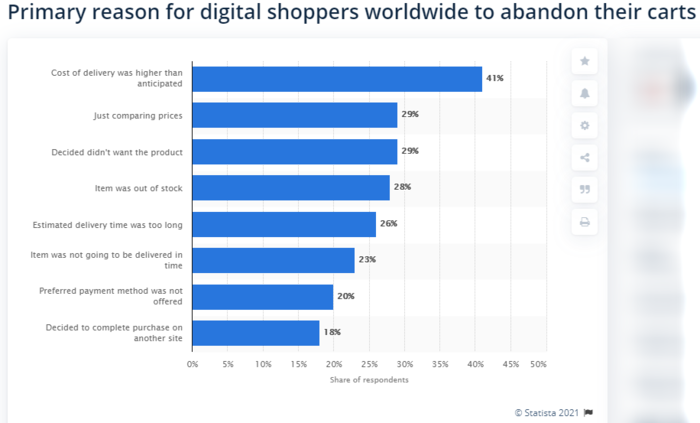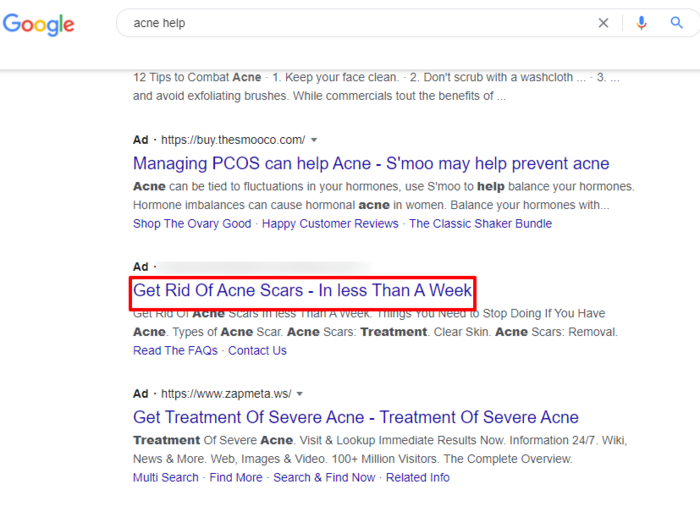

It’s no secret that competition in online advertising has become super stiff. In a bid to beat the competition, it’s easy to cross the line and employ shady tactics; tactics that may be unethical.
However, unethical PPC practices will do more harm than good for your business. They can also get you in trouble with the law.
That’s why as a digital marketer, you must always prioritize business ethics in all you do, including in your PPC ads.
Business ethics play a huge role in the success of your business. That’s why today, I want to focus on the topic from a PPC ads perspective.
The Importance of Business Ethics in PPC Ads
Business ethics refers to the moral principles that serve as guidelines for the way you conduct business. This includes everything from how you attract customers (via advertising) to the way you transact with them and everything in-between.
Business ethics are based on values like honesty, fairness, transparency, and social responsibility. An ethical marketer builds their PPC campaigns based on both moral and business perspectives.
In short, your PPC campaigns must help your prospects, not trick them into making a purchase, and they should also benefit your business. For some, walking this fine line is the most challenging aspect of running effective PPC ads.
Now, what’s the importance of business ethics in PPC ads?
Business Ethics Help You Build Strong Relationships With Customers
One of the most important reasons to practice business ethics in your PPC ads is to help you build strong relationships with your customers. People trust ethical brands as they’re authentic and transparent. They know they’ll get exactly what the brand promises in its ads.
As a marketer, put people before clicks (and profits). It will help you build strong relationships with your customers, leading you to enjoy higher retention rates.
Business Ethics Help You Develop a Good Reputation
Your reputation is one of your most important assets as a business. Two good reasons you must prioritize having a good reputation include:
- Create brand ambassadors: When a person clicks on your ad and gets a positive experience, they’re highly likely to recommend your brand to their family and friends.
- Improve your ad performance: Your brand’s reputation has an impact on the performance of your ads. Many users perform their own brand research before deciding to make a purchase. In today’s highly connected age, a poor reputation easily shows in the form of negative reviews.
Every business needs a good reputation to thrive, especially in a competitive environment. And good reputation management starts with employing good business ethics in all your activities, PPC ads included.
Ignoring business ethics in your PPC ads can only lead to wasted ad spend and a ruined business. With that out of the way, let’s quickly dive into the top five ethics you should follow as you create and run your PPC ads.
5 Examples of Business Ethics Principles You Should Follow in Your PPC Ads
To ensure your PPC ads follow business ethics principles, here are five best practices to keep in mind:
1. Don’t Advertise Misleading Products
One of the most unethical practices you must avoid as you steer your business towards ethical practices is giving your customers misleading information. Sadly, this is a common practice in the advertising industry, and some brands still utilize misinformation in a desperate bid to drive clicks. The internet abounds with examples of misleading ads; yours shouldn’t be one of them.

One of the most common examples of misinformation in PPC is advertising misleading products. This could be anything that includes:
- advertising products you can’t supply
- using a high-traffic keyword that’s not relevant
- using hype to infer your product does what, in reality, it doesn’t
There are many more ways unethical advertisers use misleading information to drive clicks. However, no matter how desperate you are to get people to click on your ads, don’t mislead your customers.
While you may get the clicks you want, the long-term effects of such unethical business practices are not worth it. For one, you’ll lose your customers’ trust. Even if they click on your ads, they’ll be so disappointed they won’t purchase what you’re selling.
No matter what products or services you’re advertising, be honest about the features and benefits. There are always people looking for what you have to offer.
Exaggerating the benefits of your product or service is tantamount to making a false claim. Promising your prospects a level of quality you can’t deliver will only ruin your reputation.
2. Only Include Honest Links in Ads
Business ethics, especially in PPC, demands that the message in your ads and the link destination must match.
Anything else is dishonesty.
Unfortunately, many unscrupulous businesses send people who click on a link in their PPC ads to a different destination. They advertise one thing and send visitors to a different landing page. Pulling a bait and switch like this goes against good business ethics. More than that, it leads to you losing your integrity as a business.
Besides the loss of integrity, dishonest links can lead to you being penalized for unethical practices. When your link takes customers to a page unrelated to what you’re advertising, your ad is considered a fake ad, and Google will take it down.
Dishonest links are prevalent among marketers who get paid using the cost-per-impression (CPM/CPI) model. They try to rack up impressions on their ads by creating their ads around popular keywords that attract a lot of traffic. When users click on the link, they’re directed to a different product or business.
As an ethical marketer, such tactics should never even be mentioned in your strategy and planning sessions. No matter how competitive your space may be, stick to ethical business practices.
3. Sell Your Products at Fair Prices
While some business ethics are clear-cut, others are not. Ethical pricing is one of those that isn’t so obvious.
If you’re wondering, ethical pricing means charging an amount that’s fair for your products.
It’s pricing your products in a way that allows you to make a profit without defrauding your customers. Doing so is not always easy as there are many factors that you have to consider to price your products fairly. The most significant are:
- market factors
- your competitors’ pricing
- availability
Besides fair pricing, you must also ensure to practice ethics in your PPC ad campaigns as a marketer. Make sure you’re fully transparent about all the costs your customers will incur when purchasing your product or services. There’s nothing as frustrating as thinking you’ve found the best deal on a product, only to click on the ad and discover the advertised price wasn’t genuine.
From shipping to discounts and everything in between, your ads must be clear about the final price your customers will pay for your product. Doing so is essential to building trust with your customers. It’s also critical to reducing cart abandonment as undisclosed shipping costs are one of the leading causes of cart abandonment.

The bottom line is, sell your products at a fair price and make sure you’re transparent about pricing in your PPC ads and landing pages.
4. Don’t Plagiarize
As a marketer, you probably look for inspiration from ads that have performed well, but that’s as far as competitor research should go.
Never plagiarize other brands’ ad copy.
For your brand to do well online, you must follow Google’s search evaluator guidelines, the most significant being the EAT guidelines. Google’s EAT guidelines have a huge bearing on how you ethically create your PPC ad copy. Here’s what the acronym stands for and what it means to your ad copy creation:
Expertise
Your ad copy must reflect your expertise in your niche or industry. Show your customers why you’re the best. However, make sure not to stretch the truth as that would be dishonest and unethical.
Authoritativeness
People want to buy from brands that have built a reputation for themselves. A good reputation is born out of practicing good business ethics. Let your authority shine through every piece of content in your sales funnel—especially your ad and landing page copy.
Trustworthiness
Trust is one of the most significant factors that drive clicks to your ads. To build trust with your audience, you must be authentic. Avoid plagiarizing other brands’ ads or any other assets that have had a positive impact on their ads.
With so many brands vying for the same customers, authenticity and originality are essential to helping you stand out from the crowd. Following Google’s search evaluator guidelines will help you ensure your content does just that.
Your ad copy will have your unique personality and highlight your particular area of authority, thereby allowing you to attract your ideal buyer persona. More than that, it will help you rank well and drive clicks to your offer.
5. Don’t Use Click Fraud
One of PPC’s strengths has become a loophole that devious marketers now exploit. Yes, I’m talking about the cost-per-click (CPC) model and how some marketers commit click fraud.
What is click fraud?
Click fraud is when an individual exploits PPC ads by repeatedly clicking on them to generate fraudulent charges. As a result, the advertiser’s ad spend shoots through the roof while their conversion rates tank. Not to mention that crucial data said advertiser uses to create better iterations of their campaign gets skewed.
The main reason unscrupulous marketers leverage click fraud as part of their business strategy is to exhaust their competitor’s ad budget. Once their budget is spent, their ads will decrease, giving the unethical marketer a better shot at driving traffic to their ads.
Marketers also sometimes use click fraud on their own ads to “game” paid search advertising. By generating more clicks on their ads, they boost their quality score on Google Ads.
Your quality score depends on many factors, with the main two being ad relevance and the click-through rate (CTR) the ad generates. Both are factors that can be manipulated through click fraud.
Why would a publisher commit click fraud on their ads?
Simple. A good quality score is critical to marketers as it results in:
- lower CPC
- lower acquisition costs
- better rankings for ads
While the advantages of having a good quality score are massive, you shouldn’t stoop to click fraud to get them. Improve your score as best you can, but make sure it’s within the confines of good business ethics.
Business Ethics in PPC FAQs
Using hype in your ad headlines is unethical. It’s the same as clickbait and should never be used to move people to click on your ads.
Instead, use benefit-driven headlines as they’re more truthful. They also address your target audience’s pain points, resulting in better conversions.
The type of foundation you lay for your business determines its outcome. Once you start using unethical business practices, you’ll use them every time you need a “quick fix.” So, yes. It’s wrong to manipulate clicks at any stage of your business, even for the sake of just gaining traction.
Business Ethics Conclusion
Despite the economic atmosphere being cutthroat, you must ensure you conduct your business ethically.
That’s especially true for your advertising tactics.
People don’t like being scammed, and unethical PPC ads fall on the dark side of false, misleading, and spammy advertising. While you may initially get some traction using deceptive advertising, you won’t succeed in the long run.
To build a sustainable business, you can only do so based on implementing good business ethics. Be ethical on social media, in your content, your PPC ads, and everything else you do to boost your business. This way, you’ll be able to build a good reputation and grow your loyal repeat customers.
What other business ethics examples and best practices do you think PPC advertisers should follow?

